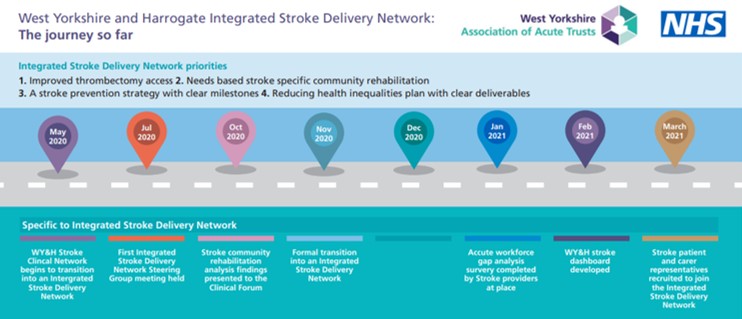Integrated Stroke Delivery Network milestones (ISDN)
 Read more about the West Yorkshire and Harrogate Integrated Stroke Delivery Network's journey so far. We've taken stock and noted our milestone moments from May 2020 to November 2021.
Read more about the West Yorkshire and Harrogate Integrated Stroke Delivery Network's journey so far. We've taken stock and noted our milestone moments from May 2020 to November 2021.
The Integrated Stroke Delivery Network priorities include:
1. Improved thrombectomy access
2. Needs based stroke specific community rehabilitation
3. A stroke prevention strategy with clear milestones
4. Reducing health inequalities plan with clear deliverables.
View the journey so far document here.
View an accessible version of the journey so far document here.
Having a stroke is a medical emergency – Act F.A.S.T and dial 999 immediately
As a Partnership we urge people not to ignore signs and symptoms that could be potentially life changing and life threatening.
Stroke is the largest cause of disability in the UK and the fourth biggest killer. In West Yorkshire and Harrogate, around 3000 people a year have a stroke with two thirds of stroke survivors left with some form of physical, mental or emotional disability – often completely life changing. During the first wave of the pandemic, many people with medical emergencies were reluctant to hospital and may have missed out on life changing treatment.
Knowing the signs of a stroke is key and people need to Act F.A.S.T. if they or someone close to them experience the following:
to them experience the following:
- Face – has their face drooped?
- Arms – do they have arm weakness?
- Speech – Is it slurred or absent?
- Time – Time to dial 999 immediately.
Every second of delay, perhaps through calling a GP practice to make an appointment, may lead to further loss of brain cells and reduce the chances of survival or avoiding disability.
Stroke is a medical emergency - if you spot the signs, Act F.A.S.T. and dial 999 immediately
Prabal K Datta, Stroke Consultant at The Mid Yorkshire Hospitals NHS Trust and Lead Clinician for the West Yorkshire and Harrogate Integrated Stroke Delivery Network said
“Since the start of the pandemic our experience shows that many people have remained at home with stroke symptoms. I strongly want to remind people that stroke services across the whole of West Yorkshire and Harrogate have been fully operational throughout the pandemic and continue to be so. I urge people not to delay seeking emergency medical attention.”
Robert Minton-Taylor, stroke survivor, who receives his care and treatment in West Yorkshire, said
“If you have had a stroke you should never worry about calling an ambulance and going into hospital. There is a four-hour window for thrombolysis treatment between the first signs of a stroke and successful recovery from one.”
“If you have a stroke it is critically important that you get to a hospital right away because it could save your life. Men don’t like complaining or making a fuss. We can be as stubborn as mules. I thought I had cramp and took myself off to bed thinking a night’s sleep would cure it. Fortunately, my wife, a former nurse, noticed that the left side of my mouth was drooping and rushed me to hospital. I was told the following day that had I left it an hour longer I may have died.”
Testimonies from other stroke survivors in West Yorkshire and Harrogate include Sidney who received emergency stroke treatment and continues to receive ongoing rehabilitation is full of praise for the entire workforce. He said
“the nurses that I have had, have been absolutely brilliant and the Doctors were brilliant as well. The staff made me feel comfortable and were good with my wife and were good at keeping in contact with her. I am still recovering from my stroke , I still have trouble with my speech and my left hand, but the speech and language therapists and the physio who are coming are brilliant”.
As they reflected on the experience and the opportunity to share their gratitude Sidney and Christine his wife said
“The ambulance drivers that brought me in were brilliant” and ”I just want to say thank you, everybody especially the ambulance team were so good to him”



 Read more about the West Yorkshire and Harrogate Integrated Stroke Delivery Network's journey so far. We've taken stock and noted our milestone moments from May 2020 to November 2021.
Read more about the West Yorkshire and Harrogate Integrated Stroke Delivery Network's journey so far. We've taken stock and noted our milestone moments from May 2020 to November 2021.  to them experience the following:
to them experience the following:  ove stroke care along the whole of the pathway, from the onset of stroke, urgent and acute care, rehabilitation and life after stroke. Aligned to the NHS Long Term Plan (2019) the West Yorkshire and Harrogate Integrated Stroke Delivery Network has been established, to enable services to work more closely together and share best practice, with the aim of delivering the best care possible for the people of West Yorkshire and Harrogate.
ove stroke care along the whole of the pathway, from the onset of stroke, urgent and acute care, rehabilitation and life after stroke. Aligned to the NHS Long Term Plan (2019) the West Yorkshire and Harrogate Integrated Stroke Delivery Network has been established, to enable services to work more closely together and share best practice, with the aim of delivering the best care possible for the people of West Yorkshire and Harrogate.